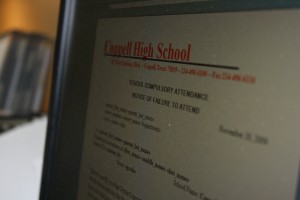
By: Henna Khan
Staff Writer/Photographer
Just recently I received a letter from the school board warning me that I was “at risk of losing credit” for certain courses that I am enrolled in, however it did not specify which courses . Unfortunately, the letter reached my parents before I was aware of the problem and the accusations began left and right. My parents were under the impression that I was skipping class whenever I felt the need to, but this was in fact far from the actual truth.
Medical appointments, school related activities, family commitments, or plain old laziness are amongst the reasons students use to excuse themselves from school. For me it was a few debate tournaments here and a couple of medical appointments there, but when these days started to add up the school board made it a bigger deal than it actually was. Suddenly I felt like the juvenile delinquent I never was.
According to the state law, students must be in attendance 90% of the time class is in session to receive credit.
The handbook specifically states that personal illnesses, competition in non-school related events, court appearances, religious holidays, and many more reasons are all amongst the instances in which absences will be excused. However, according to state law, after eight of these excused absences a student is at risk of losing credit, and a letter that stating this will be sent home.
While the letter is merely a warning, parents tend to read a little deeper into its meaning. My dad barged furiously into an assistant principal’s office, demanding to know why he had not been notified earlier of such an important problem. Little does the school board realize that although the letter is meant to be a warning, it causes much more stress and concern than anticipated. A simple alternative would suffice: a one on one meeting between an assistant principal and the student at risk. It would be a very brief conversation regarding the issue at hand.
“If people take the time to read the student handbook, they’ll realize that the attendance policies are fair, because with close to 2,700 kids to look after there has to be some guidelines,” Attendance Secretary Deanna Frawley said. “However, parents should not be that concerned. They should just check portal or confirm with a teacher before coming to the school.”
As far as truancy goes, the school board has legitimate reasons for targeting kids who have a noticeable amount of unexcused absences, which unlike classified excused absences, are a reason to be worried. Letters in this instance should reach parents because the issue at hand is one of skipping class for no apparent reason.
It is understandable if a student is failing a class that he or she is not attending often due to medical appointments or family emergencies, but kids who make substantially good grades but have instances in which they cannot be at school should not be punished by losing credit for those courses. The letters create lots of unnecessary tension amongst parents, which can easily be avoided.
“When it comes to ‘excused’ absences, the school board should definitely issue a warning to the student before getting parents involved, because a lot of the time the letters do not end up applying to that particular student, or that student simply can’t help the reasons he or she was out,” Junior Rose Kariampally said.
Unfortunately, the letters will be sent out inevitably, and parents will get furiously get involved as a result. So the only solution to the problem, get to the mail before they do, and talk it out with an assistant principal.








